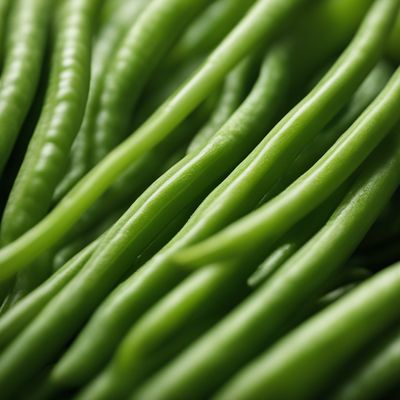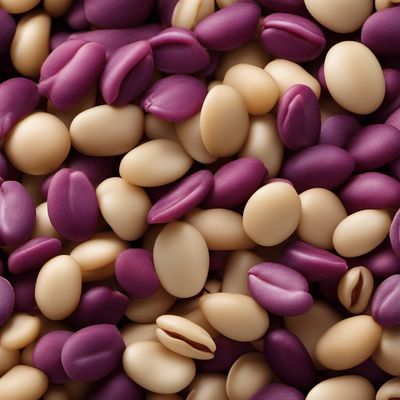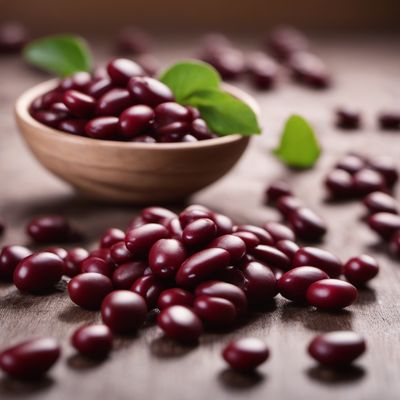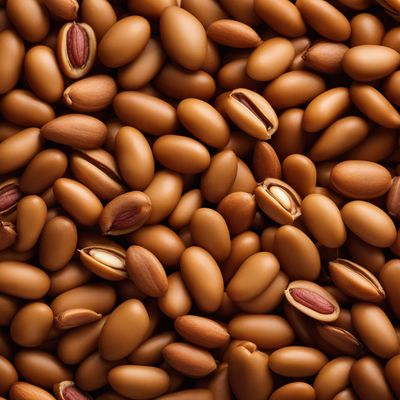
Ingredient
Beans (fresh seeds without pods) and similar-
The Versatile World of Fresh Beans
Fresh beans, also known as green beans or snap beans, are the unripe pods of various bean plants. They are harvested before the seeds fully develop, resulting in a tender and crisp texture. Fresh beans come in different varieties, such as string beans, haricots verts, or wax beans, each with its own unique characteristics. They are commonly used in salads, stir-fries, casseroles, and as a side dish.
Origins and history
Beans have a long history dating back thousands of years. They are believed to have originated in Central and South America, where they were cultivated by ancient civilizations such as the Aztecs and Incas. Beans were later introduced to Europe by Spanish explorers during the 16th century. Today, fresh beans are widely consumed and cultivated in various regions around the world.
Nutritional information
Fresh beans are low in calories and a good source of dietary fiber, vitamins, and minerals. They are particularly rich in vitamin C, vitamin K, and folate. Additionally, they provide a good amount of potassium and antioxidants. Incorporating fresh beans into your diet can contribute to overall health and well-being.
Allergens
Fresh beans are not known to be common allergens. However, individuals with legume allergies should exercise caution and consult with a healthcare professional if they have any concerns or known allergies.
How to select
When selecting fresh beans, look for pods that are firm, crisp, and free from blemishes or discoloration. The beans inside should be plump and well-developed, but not overly mature or bulging. Avoid beans with visible signs of wilting or mold. For the best flavor and texture, choose beans that are relatively thin and snap easily when bent.
Storage recommendations
To maintain the freshness and crispness of fresh beans, store them in a perforated plastic bag or a container lined with a damp paper towel. Place them in the refrigerator's crisper drawer, where they can stay fresh for up to a week. Avoid washing the beans before storing, as moisture can accelerate spoilage.
How to produce
Fresh beans can be easily grown in a home garden or even in containers. They thrive in warm climates and require well-drained soil and plenty of sunlight. Sow the seeds directly in the garden or container, keeping them well-watered throughout the growing season. Harvest the beans when they are still tender and before the seeds inside fully develop.
Preparation tips
Fresh beans can be enjoyed in various ways. They can be blanched and added to salads, stir-fried with other vegetables, or steamed as a side dish. They can also be pickled, roasted, or grilled for added flavor and texture. Experiment with different seasonings, such as garlic, lemon, or herbs, to enhance their taste. Remember to trim the ends of the beans before cooking, removing any tough or stringy parts.
Culinary uses
Fresh beans are commonly used in salads, stir-fries, soups, and casseroles. They are often paired with other vegetables, meats, or grains to create well-balanced and nutritious meals. In Mediterranean cuisine, fresh beans are frequently cooked with tomatoes, olive oil, and herbs. In Asian cuisine, they are commonly stir-fried with garlic, ginger, and soy sauce. Fresh beans are also a popular side dish in many Western-style meals.
Availability
Fresh beans are widely available in most grocery stores, supermarkets, and farmers markets. They are commonly found in the produce section, usually displayed alongside other vegetables. The availability may vary depending on the region and the time of year.
More ingredients from this category » Browse all

Black eyed peas (without pods)
The Versatile Legume: Black Eyed Peas

Vetches (without pods)
The Versatile Vetch

Monantha vetches (without pods)
The Versatile Monantha Vetches

Guar beans (without pods)
Versatile Legume Powerhouse

Broad beans (without pods)
The Versatile Legume

Yardlong beans (without pods)
The Versatile Legume

Tepary bean (fresh seeds)
The Resilient Legume

Lablab beans (without pods)
The Protein Powerhouse

Borlotti or other common beans (without pods)
The Versatile Legume: Borlotti Beans

Azuki beans (without pods)
The Versatile Azuki Beans

Jack beans (without pods)
The Versatile Legume: Unveiling the Wonders of Jack Beans

Rice beans (without pods)
The Versatile Rice Bean